CNBC/Change Research Poll in Arizona, Florida, Michigan, North Carolina, Pennsylvania, and Wisconsin: May 1-3, 2020
Key Takeaways
- 68% of voters in the battleground remain seriously concerned about the coronavirus and 52% disapprove of Trump’s handling of the outbreak.
- Fears about the economic impact of COVID-19 grow and 71% now say that we are in a recession.
- Majorities say it is important for small businesses (97%) and people who have lost jobs or wages (94%) to receive relief, 74% support recurring direct payments to individuals until the pandemic ends, and 66% support relief to state and local governments.
- Just 21% say that Trump’s policies in response to COVID favor the middle class and small businesses most.
Voters seriously concerned about COVID and disapprove of Trump’s handling of the crisis
Two-thirds of voters in the key battleground states remain seriously concerned about the coronavirus outbreak. A large majority of Democrats (97%) and independents (66%) remain seriously concerned, but only 39% of Republicans are seriously concerned today (down from 55% two weeks ago). Voters remain more concerned about the impact on their health and safety (65%) than the impact on their family’s financial situation (35%). Over 1 million Americans had been diagnosed with COVID by the end of last week, and 47% of battleground voters reported personally knowing someone with the disease.
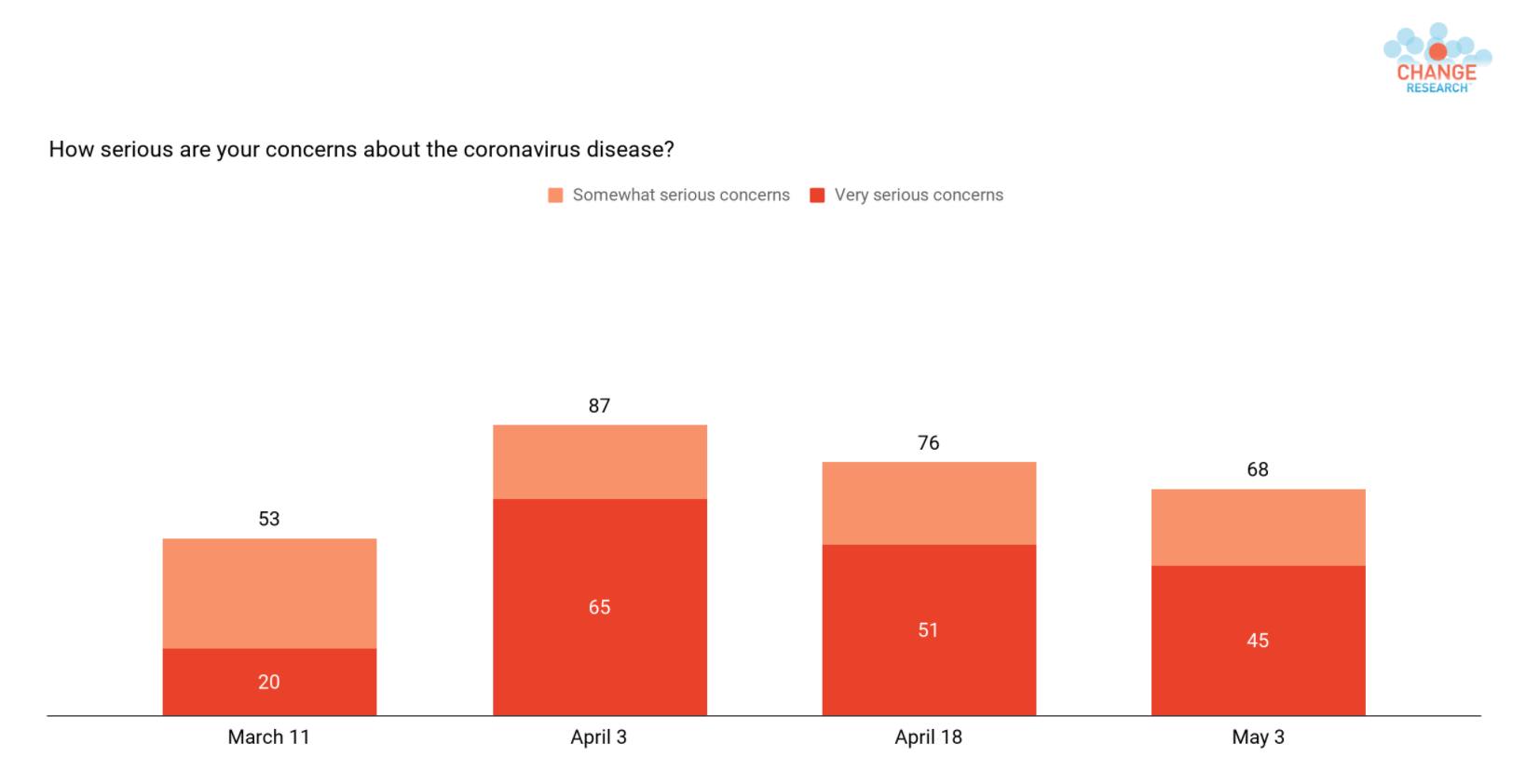
Voters give high marks to doctors and medical professionals (88% approve), their employers (82%), and Doctors Fauci and Birx (68% and 58%, respectively) for their handling of COVID. A 52% majority of battleground voters disapprove of President Trump’s handling of the outbreak, and 48% strongly disapprove. According to this poll, Joe Biden would likely win the Electoral College if the election were held today.
Voters’ precautions and worries about reopening reflect partisan divide
Overwhelming majorities continue to take precautions such as handwashing (90%), social distancing (82%), avoiding crowds (78%), not going out to restaurants and bars (75%), wearing masks in public (67%), and sheltering at home (66%). Democrats, however, are far more likely than Republicans to say they are participating in these activities: Republicans are less likely by 45 points to wear a face mask in public, less likely by 44 points to be sheltering at home, and less likely by 33 points to be avoiding crowds.
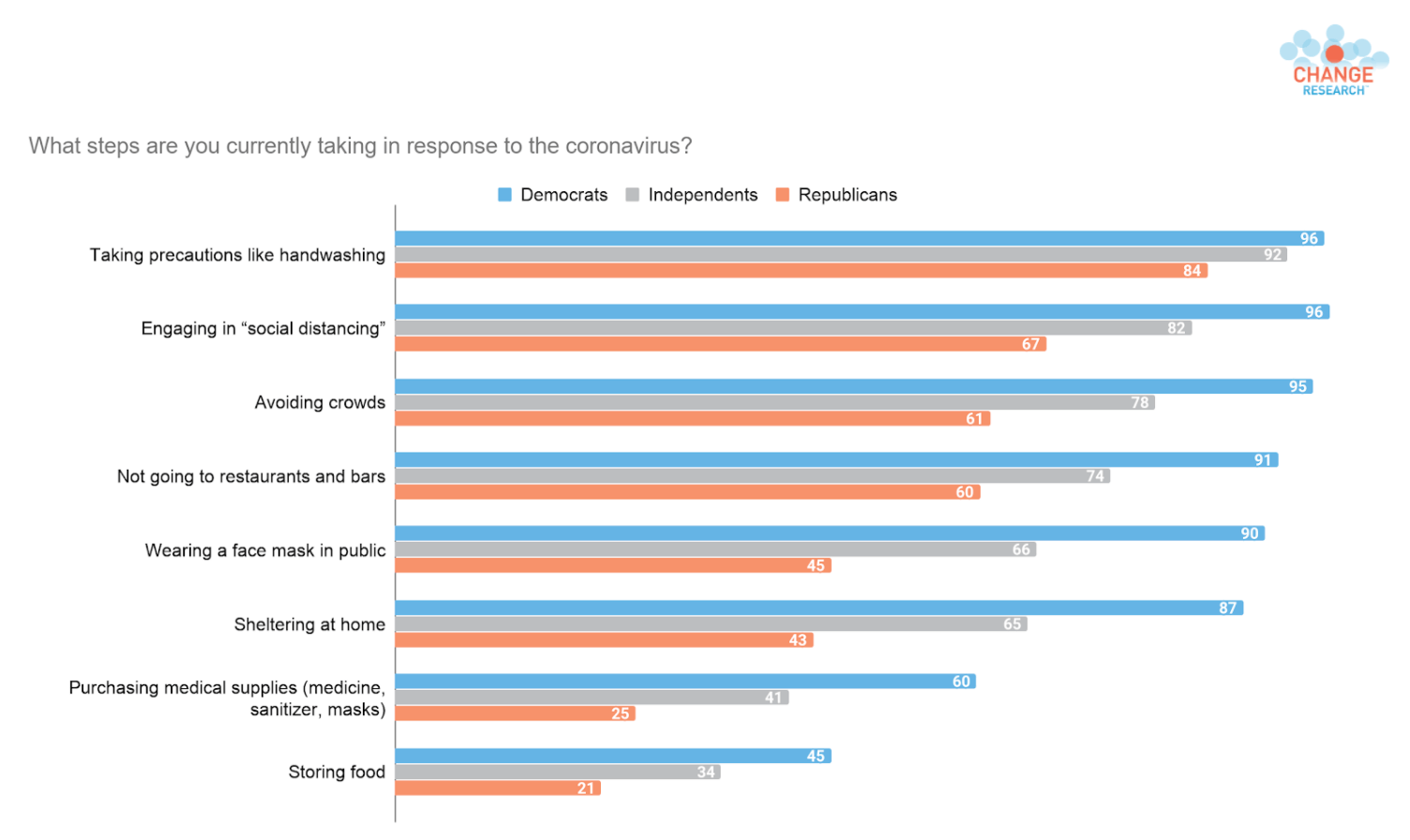
With the exception of shopping – an activity that voters have still had to do during this crisis – and going to a public beach, fewer than half of voters in the battleground say that it is safe to engage in several activities that some states are beginning to allow. For instance, just 42% say it is safe to go to a hair or nail salon, just 38% say it is safe to dine-in at a restaurant, and only 30% say it is safe for children to return to school or daycare.
While very few Democrats say that it is safe to do any of these activities at this stage, majorities of Republicans say it is safe to engage in all of them with the exception of attending a sporting event, using public transportation, or taking a flight.
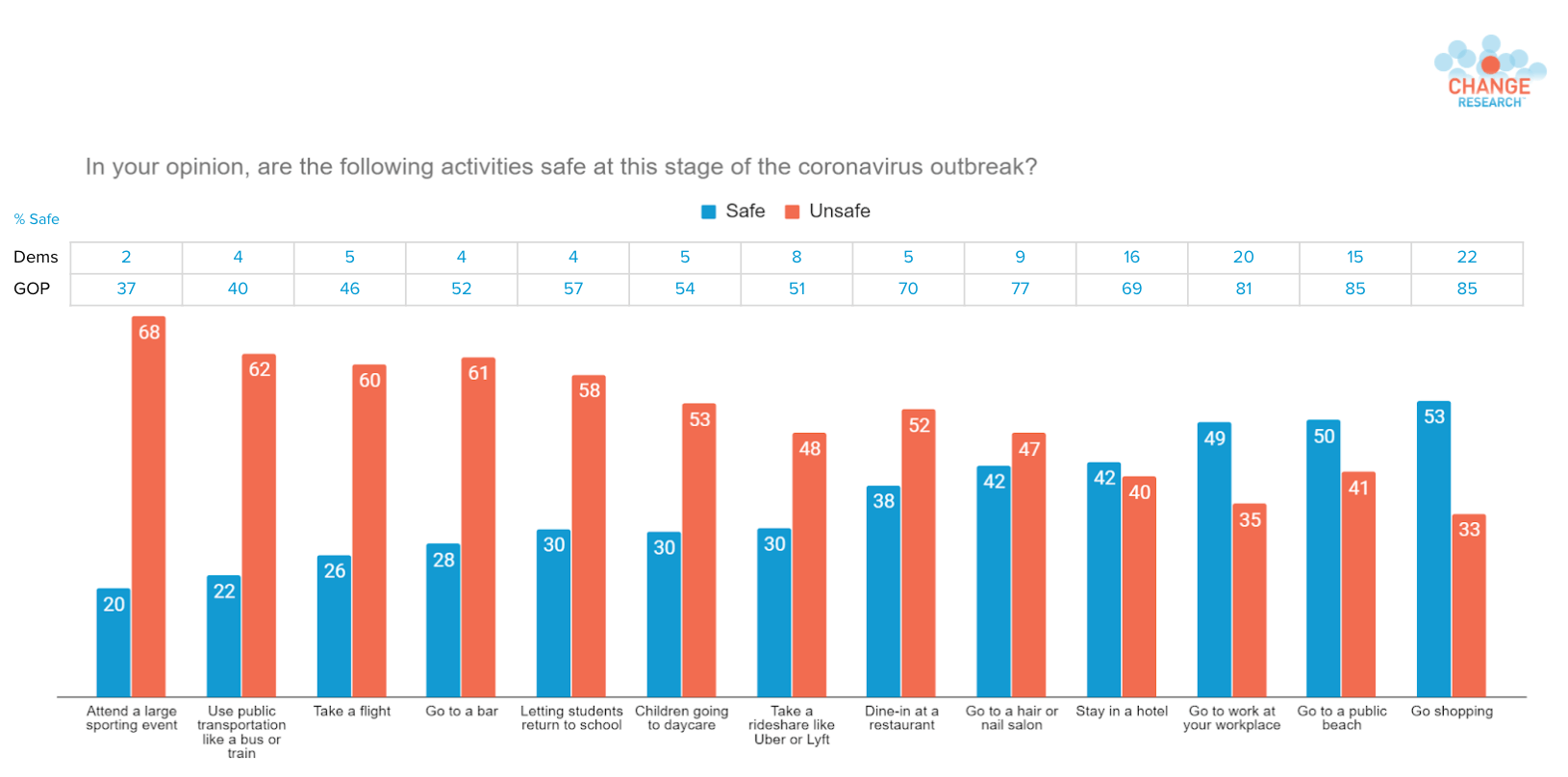
Importantly, 44% of voters have serious concerns about having to return to their place of work before they feel it is safe.
Worries of recession solidify as financial impact of COVID deepens
A 71% majority now believe that the economy is in a recession, including large majorities of Democrats (89%) and independents (73%) and half of Republicans. A 47% plurality believes that this recession will be worse than the Great Recession and 27% say it will be equally painful.
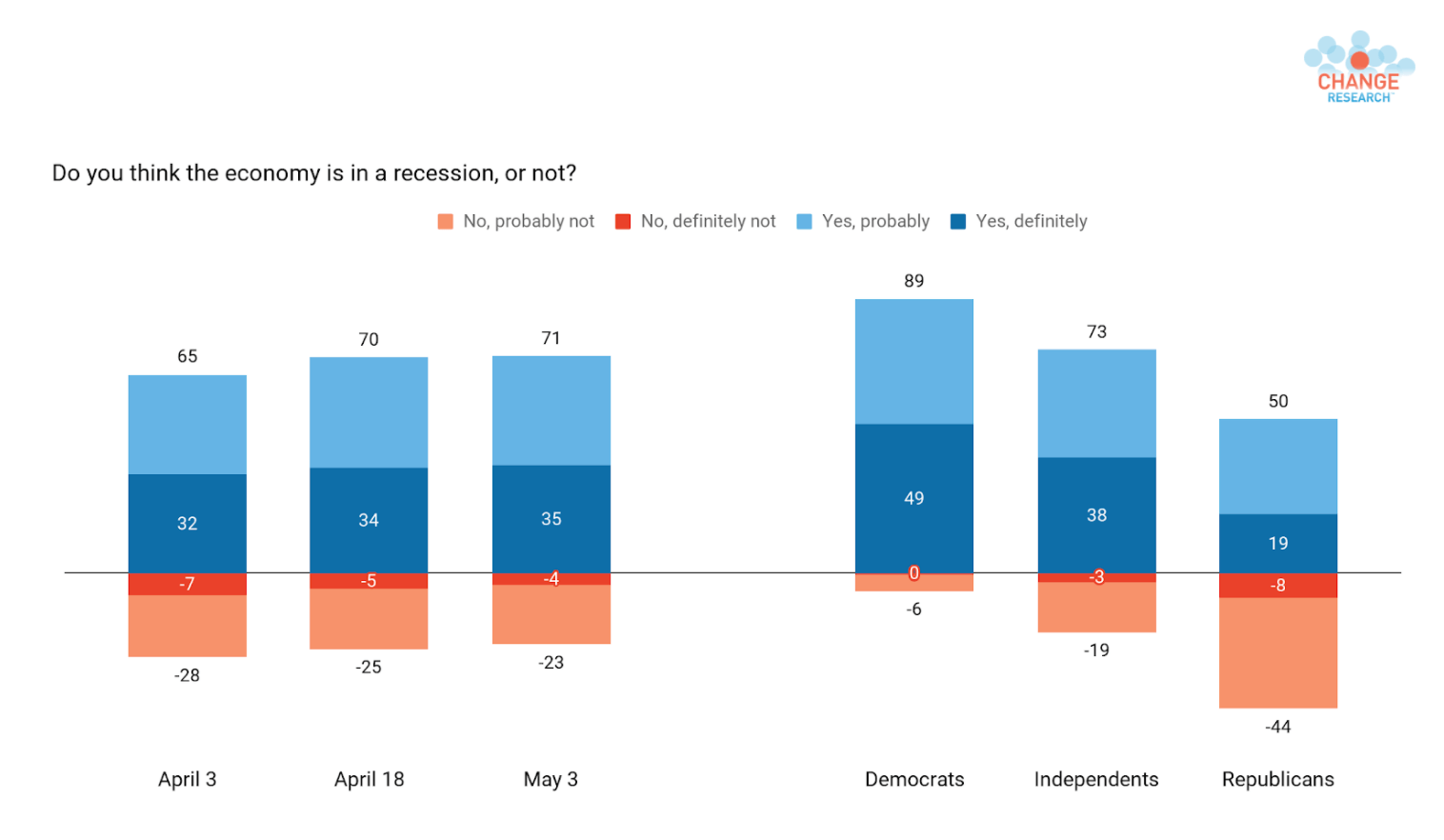
Half of battleground voters say that they or someone in their household has lost wages or a job as a result of COVID. A stunning 37% say they or someone in their household has lost a job or been furloughed as a result of COVID and just 60% of those who have lost their own job believe there is a greater than 50-50 chance that it will be there when the economy reopens.
Over three-in-ten voters, including 47% of those who make less than $50K a year, say that they have less than a month until they will be unable to afford food, housing and other essentials should they lose their source of income. One-in-four voters who expect to receive a CARES relief payment from the Treasury still have not received one (61% have received one, 11% are not eligible), and just 48% of those who have lost a job or been furloughed have been able to successfully apply for unemployment benefits.
Voters prioritize small businesses and individuals for relief and believe Trump’s policies mostly favor the wealthy and big corporations.
Only 22% of voters say we have spent too much on relief from the economic impact of COVID. Majorities say it is important for small businesses (97% very/somewhat important), people who have lost jobs or wages (94%), hospitals and health centers (86%), and state and local governments (59%) to receive federal relief.
Among white voters, the white college women and the white non-college women are also more likely than their male counterparts to report a lost job, lost wages, or knowing someone with COVID-19. Though white college men are no more likely to report a financial impact than white working class men, they are more likely to have a personal connection to people suffering from coronavirus.
There is strong bipartisan agreement (84%) that there ought to be regulations to ensure that the Paycheck Protection Program loans go to small businesses and not to companies like Ruth’s Chris and Shake Shack. There is also bipartisan support for continuing to make direct payments to qualifying individuals until the pandemic ends: 96% of Democrats, 74% of independents, and 53% of Republicans support such a policy. Two-thirds also support providing federal relief to state and local governments.
Over half of voters say it is not important at all for large corporations to receive relief (52%). Half of battleground voters in these states say that the policies of Trump and his administration in response to the economic fallout of COVID mostly favor the wealthy and big corporations, and just 21% say they mostly favor the middle class and small businesses.
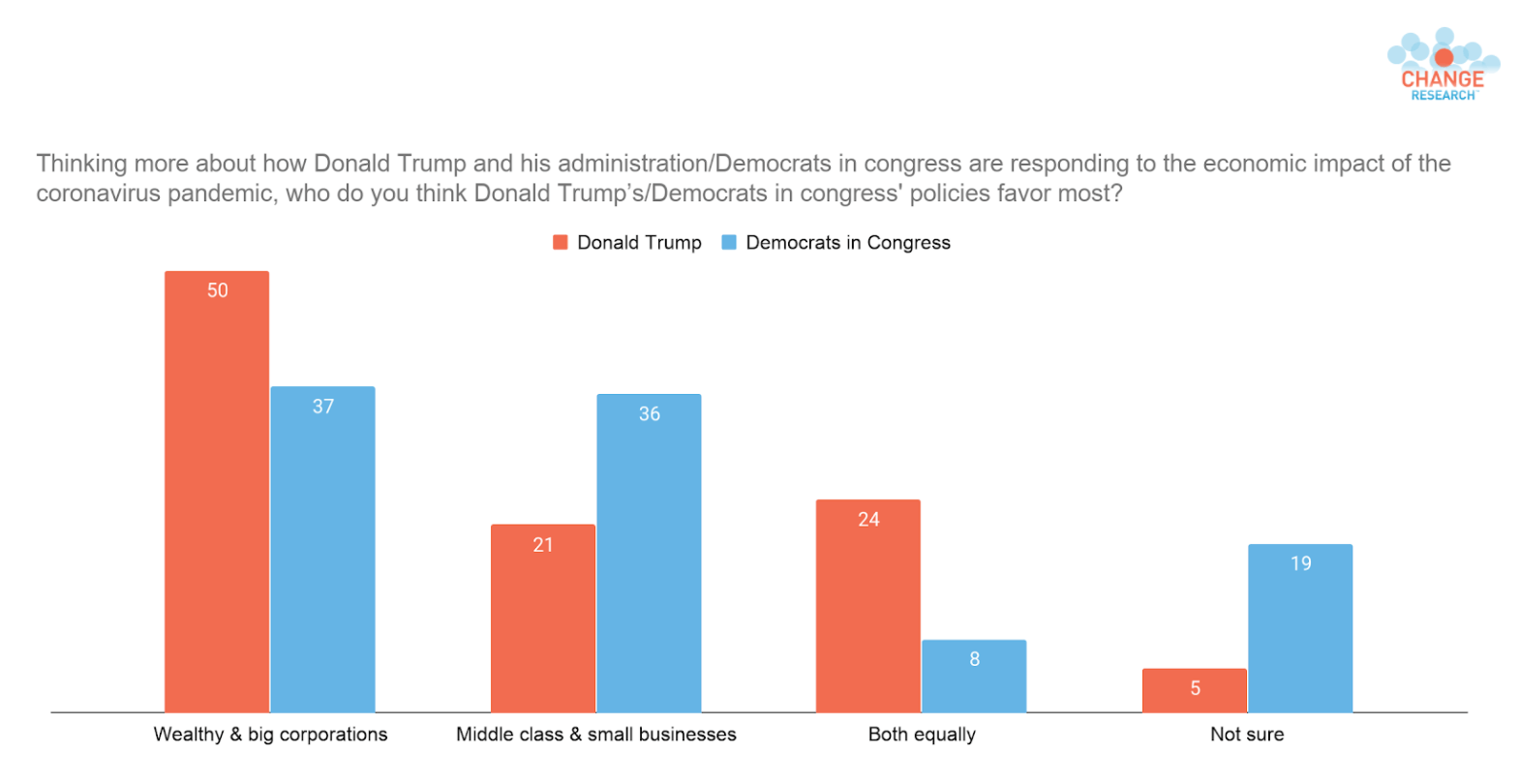
Battleground Sample & Methodology
National Companion Survey Toplines
National Companion Survey Sample & Methodology
For media inquiries, please email [email protected]
Change Research conducted a poll of 3,544 likely general election voters May 1-3, 2020 across 6 competitive battleground states: Arizona, Florida, Michigan, North Carolina, Pennsylvania, and Wisconsin. A companion national survey of 1,489 likely voters was also conducted May 1-3, 2020. Unless otherwise stated, the results presented in this analysis are among battleground state voters. The margin of error, as traditionally calculated, is ±1.7% for the battleground and ±2.5% for the national poll. Change Research reaches voters via targeted online ads that point people to an online survey instrument. Our Dynamic Online Sampling establishes and continuously rebalances advertising targets across region, age, gender, race, and partisanship to dynamically deliver large samples that accurately reflect the demographics of a population. Post stratification was done on state, gender, age, race, education, and 2016 presidential vote.
This is the fourth in a series of bi-monthly battleground state and national surveys that CNBC & Change Research will conduct in 2020. The first wave was conducted March 9-11 among 2,483 likely general election voters in the battleground (MOE ± 2.0%) and among 1,541 interviews likely general election voters nationally (MOE ± 2.5%). The second wave was conducted April 2-3 among 2,448 likely general election voters in the battleground (MOE ±2.0%) and among 1,200 likely general election voters nationally (MOE ±2.8%). The third wave was conducted April 17-18 among 5,787 likely general election voters in the battleground (MOE ±2.5%) and among 1,178 likely general election voters nationally (MOE ± 2.9%). The third wave was conducted May 1-3 among 3,544 likely general election voters in the battleground (MOE ±1.7%) and among 1,489 likely general election voters nationally (MOE ± ±2.5%).
